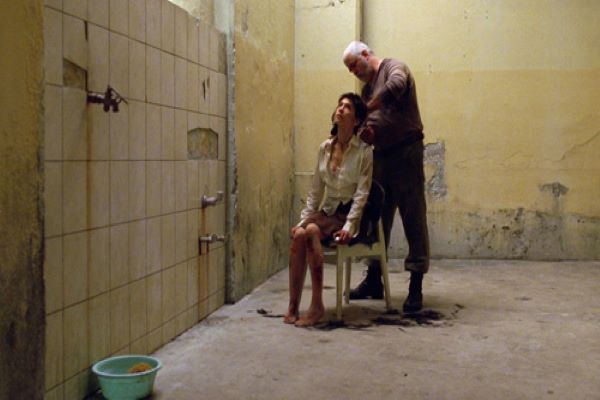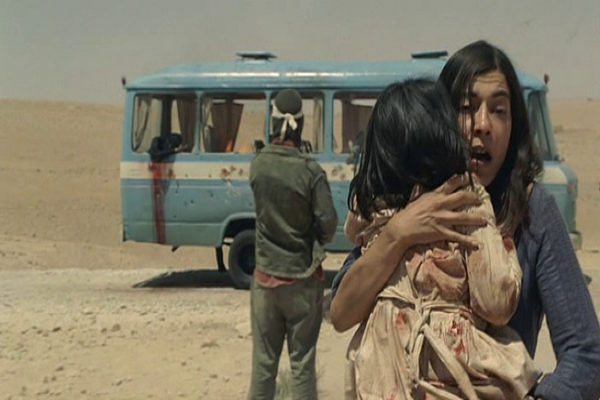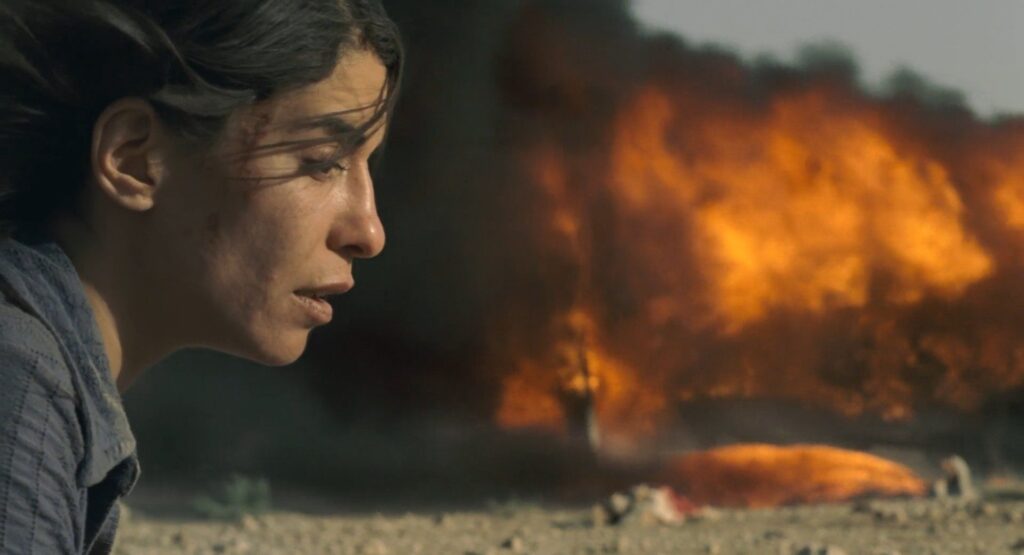Denis Villeneuve’s Incendies is an utterly serious and strong film. Even though it is a Canadian film, the story is mostly set in an unnamed country, which is very much similar to Lebanon, in the Middle East. The film is both violent and emotional. It deals with very serious issues like civil war, communalism, murder, rape, hatred, honor killing, separation, militia, disintegrated family, search for lost family members, and violence. Cinema cannot be more original. Incendies is deeply connected to realize and discover familial ties.
Incendies starts with twin siblings Jeanne (Melissa Desormeaux-Poulin) and Simon (Maxim Gaudette) meeting their mother’s former employer and notary Jean Lebel (Remy Girard) at his office in Quebec, Canada after her death. Their mother Nawal Marwan (Lubna Azabal), a Christian immigrant to Canada from the Middle East, kept two sealed letters with Jean to be delivered to her children Jeanne and Simon. Jeanne is asked to track down their father whom they have never seen and met. Simon is asked to track down their brother whose existence they were previously unaware of. Jeanne is all set to travel to the Middle East to fulfill her mother’s last wish. Simon had a strained relationship with his mother Nawal, and he is not interested to fulfil his mother’s wish.

Nawal Marwan’s life is depicted in the film in a series of flashbacks. She was a Christian but fell in love with a Muslim refugee name Wahab resulting in her pregnancy. Her brothers kill Wahab as honor killing. Nawal is saved by her grandmother who helps her deliver the baby. The baby is tattooed beside the ankle, abandoned, and sent to an orphanage. Nawal leaves for the fictional city of Daresh where she is admitted to a university. A violent civil war breaks out. Christian nationalists attack the university and open fire repeatedly. A Muslim militant Chamseddine destroys the Christian orphanage in Kfar Khout where Nawal’s son is supposed to be kept, and he converts her son to a Muslim child soldier. While returning from Kfar Khout, her bus, which is full of Muslim passengers, is attacked by the Christian nationalists who open fire at the passengers killing all of them except Nawal. She shows the Crucifix to prove her religion. The bus is then set on fire. She joins the Muslim fighters and kills one of the main Christian nationalist leaders. Nawal is imprisoned at Kfar Ryat where she is repeatedly tortured and raped by Abou Tareq making her pregnant. She gives birth to the twins in the prison.
Jeanne meets multiple people in the Middle East and tries hard to uncover the life incidents of her mother. She requests her brother Simon to join her in her endeavor which he accepts. They come to know from Jean Lebel that the name of their step-brother is Nihad May. Their world falls apart when Simon meets Chamseddine and he informs him that Nihad May changed his name to Abou Tareq in Kfar Ryat. This establishes Nihad as both their father and step-brother. Finally, they track down Nihad in Canada and deliver both the letters. The letter addressed to the rapist is full of contempt and the letter addressed to Nawal’s long lost son is full of love and sympathy. Nawal had met Nihad at a swimming pool in Canada and from his tattoo and his face realized that both her son and rapist are the same person. In the last scene, Nihad is seen standing quietly beside the grave of his mother.

Denis Villeneuve was so deeply moved by Wajdi Mouawad’s play of the same name that he decided to transform this play into a feature film. Even though Villeneuve himself is a French- Canadian and does not have much exposure to the Middle East, he set up a strong research team to make this film a reality. Mouawad’s play was always the backbone of the film during the making process. The country in the Middle East depicted in the film is kept anonymous for avoiding political controversies, even though it largely resembles Lebanon. Villeneuve personally hates violence, and he makes films based on the subjects that scare him. Incendies is not about war and violence, rather how to do away with those from the modern world. The purpose of the film is not to divide based on religion and hatred but to unite the world against it.
Incendies is also about anger and disintegration in a family amongst the family members. Jeanne and Simon did not have a normal relationship with their mother Nawal. They did not know Nawal’s turbulent and traumatic past life. More they uncover the truth, their mother’s punishing agony becomes clearer to them. Villeneuve was deeply shocked and tormented by the pain amongst the family members. The trauma was so severe that Nawal suffered a heart attack when she discovered that her son and her rapist actually are the same person. Nothing in this world can be more painful than this. Incendies is an extremely strong and traumatic story. There is a scene in the film where Christian nationalists attack a bus, kill all the Muslim passengers, and set the bus on fire. A devastated Nawal beside the burning bus makes one of the most tragic scenes ever in cinema history. Incendies is not only about war, killing, violence, and hatred but also about how to eliminate those and bring forward love, peace, and reconciliation. Besides writing a contempt letter for the rapist, Nawal also wrote a love-filled letter for her son who was deprived of his mother’s unconditional love. The film shows vividly what can happen to the world without love and care. War and violence never did anything good to anybody and those can never be the way forward.

One of the most important aspects of Incendies is the magnificent cinematography by Andre Turpin. His camera always followed the characters and captured the scenes in the Middle East realistically especially the war scenes. Radiohead’s “You and Whose Army” sets the perfect introductory music for the film in the orphanage focusing on Nihad’s face. Music director Gregoire Hetzel also used opera brilliantly. Adapting Mouawad’s play was not an easy job. Villeneuve did a fantastic job writing the adapted screenplay based on Mouawad’s play of the same name. As a filmmaker, he achieved a high level of excellence through Incendies which is always a very difficult and sensitive film to make. Lubna Azabal delivered a brilliant performance throughout the film. Melissa Desormeaux-Poulin, Maxim Gaudette, and Remy Girard justified their roles. Incendies was nominated for the Best Foreign Language Film at the 83rd Academy Awards, and Best Film Not in the English Language at the 65th BAFTA awards.


I will right away take hold of your rss as I can’t find your email subscription link or newsletter
service. Do you have any? Please let me realize so that I may just subscribe.
Thanks.
Here is my blog post: “https://x.com/rayanwebb/status/1740571631867830311?s=20
Thank you. Will create the subscription option shortly. You may want to follow my YouTube channel also.
https://www.youtube.com/@mainakmisradirector